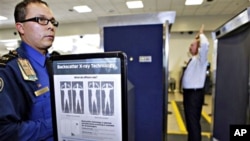As millions of Americans travel during the country's Thanksgiving holiday, they face new heightened security procedures at the nation's airports. Federal authorities instituted the measures earlier this month and some fliers say the techniques are too intrusive.
It's the first time holiday travelers have faced such tough security measures at the nation's airports. Fliers now go through full body X-ray scanners at many airports. The scanners produce revealing body images and some are offended.
One male traveler said, "Generally, I'm opposed to it. I think that the technology can be abused no matter what they are telling us."
If air travelers refuse to go through the imaging machines they are physically examined in public by security screeners. A USA TODAY/Gallup public opinion survey finds a majority of fliers don't like this either.
A woman traveler said, "It's embarrassing to stand in front of all those people and it's like getting groped."
During pat-downs, screeners of the same sex physically examine travelers, including intimate parts of the body. This woman said one security screener went too far. "She ran her hand like this, up the inside of my leg, but she did it so hard and so rough that she lifted me, my heels right up off the ground."
Transportation Security Administration officials say less than three percent of the more than 35 million airline passengers who have traveled since November 1 have received pat-downs, and the agency has received about 2,000 complaints about the new measures. Yet surveys indicate two-thirds of air travelers say strict security measures are necessary to prevent terrorist attacks.
Another man traveling said, "I was in the military so I remember 9/11 [September 11, 2001 terrorist attacks] vividly, and anything to kind of make everybody safer and ensure everybody's safety I am usually all for."
Federal authorities instituted the new measures following several foiled terrorist plots against U.S. targets. A Nigerian man is charged with attempting to blow up a U.S.-bound airliner December 25, 2009 with explosives hidden in his underwear.
Transportation Security Administration chief John Pistole said the agency is trying to strike the right balance between privacy and security. "We know the threats are real so that's what we try to deal with here. To keep it in context, the reason we are doing these type of pat-downs and using advanced imaging technology is trying to take the latest intelligence of how we know al-Qaida and its affiliates would want to hurt us [the United States], and how they want to bring down, whether it's passenger aircraft or cargo aircraft."
Some who oppose the screenings called on air travelers Wednesday to protest against the full-body scans and demand the pat-downs. That takes much longer and could lead to longer security lines.
Government officials say they will continue to evaluate the new security measures and make changes where necessary. They say the full-body scan machines are here to stay and will be used at 450 commercial passenger airports by the end of next year.











